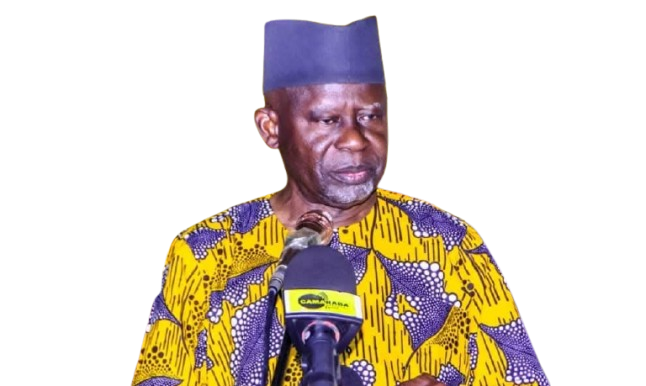Gambiaj.com – (Banjul, The Gambia) – A viral video of opposition leader Ousainou Darboe criticizing the withdrawal of Ba Tambadou’s candidacy for the International Criminal Court (ICC) has reignited debates on tribal politics in The Gambia – yet it also risks obscuring the deeper political reasons behind the government’s controversial decision.
In the video, Darboe lambasted President Adama Barrow for what he described as a missed opportunity to elevate a highly qualified Gambian to one of the most prestigious legal bodies in the world.
He accused Barrow of withdrawing support for Tambadou in favor of a Nigerian nominee, suggesting that the move betrayed national interest and failed to leverage Barrow’s position as Chair of the Organisation of Islamic Cooperation (OIC).
But it wasn’t Darboe’s attack on Barrow’s foreign policy judgment that sparked intense public debate—it was the way he racialized the issue.
“Let’s not talk about tribe—I never have,” Darboe said. “But if it were about tribe, I wouldn’t have endorsed Ba Tambadou. Everyone knows he’s a Sarahule… I supported him not because of his tribe, but because he’s a competent Gambian.”
Addressing the Sarahule community directly, Darboe added, “I want the Sarahules to judge for themselves. Your son, Ba Tambadou, was in the running… Yet Adama Barrow chose to withdraw his nomination in favor of a Nigerian.”
The remarks have been criticized for stoking ethnic sentiment—despite Darboe’s professed rejection of tribalism.
Commentators under the video post and several known activists warn that such rhetoric could inflame ethnic divisions in an already fragile political environment.
Political Calculations Behind the Withdrawal
Yet behind the emotionally charged framing lies a far more complex and politically sensitive reality—one that Darboe did not address in his public statement.
Ba Tambadou and others involved in handling the sale of assets seized from former President Yahya Jammeh are now facing serious questions.
Media reports and newly released documents about these sales have raised concerns, turning the issue into a major political controversy.
As a result, the National Assembly has launched public hearings through a special committee.
Tambadou, who served as Attorney General and later as Minister of Justice, played a leading role in carrying out the recommendations of the Janneh Commission. These included the Janneh Commission taking control of and selling off millions worth of assets—such as properties, vehicles, and businesses—that were allegedly acquired through corruption during Jammeh’s time in power.
The Barrow administration has faced increasing pressure to explain inconsistencies in how these assets were managed and sold.
Key questions have arisen over due process, transparency, and whether state institutions and public interest were adequately safeguarded.
Tambadou’s role is now central to those questions, making his candidacy for the ICC politically untenable.
Government insiders and legal observers believe that President Barrow withdrew Tambadou’s nomination not out of indifference or lack of national pride, but because proceeding with his candidacy risked internationalizing a politically volatile domestic issue.
“In this climate, supporting Tambadou would mean defending not just a qualified jurist, but a legacy of asset management that is under scrutiny,” one observer noted. “Barrow likely calculated that the political risk outweighed the diplomatic gain.”
Tribal Rhetoric vs. Accountability: A Missed Opportunity for a Broader Conversation
By choosing to frame the issue through the lens of ethnicity, Darboe has arguably shifted attention away from legitimate questions of accountability and state integrity.
While Tambadou’s qualifications are widely recognized—including his past work at the UN tribunal for Rwanda and his leadership in launching The Gambia’s transitional justice process—the question of whether he mishandled or improperly managed Jammeh’s seized assets remains unresolved.
Darboe’s assertion that “tribe” had nothing to do with his position was immediately undercut by his repeated reference to Tambadou’s Sarahule identity and his appeal to that community to view the rejection as a slight against their son.
This pattern fits into a broader critique often levied against Darboe: that he has used identity politics to consolidate support during politically difficult moments. While his party, the United Democratic Party (UDP), remains a multi-ethnic formation, critics say his messaging at times appeals more narrowly than it admits.
Ultimately, Darboe’s comments risk obscuring a conversation The Gambia urgently needs: how the country handles the legacy of authoritarian-era assets and the conduct of its transitional justice leaders. Tambadou, as a symbol of both legal excellence and administrative controversy, sits at the heart of this conversation.
In choosing to focus on tribe rather than transparency, Darboe may have undercut his own credibility—both as a national statesman and as a defender of accountability.
As the video continues to circulate, the country is left to confront not only the politics of international representation but also the deeper fissures of identity and justice that still shape its democratic evolution.










